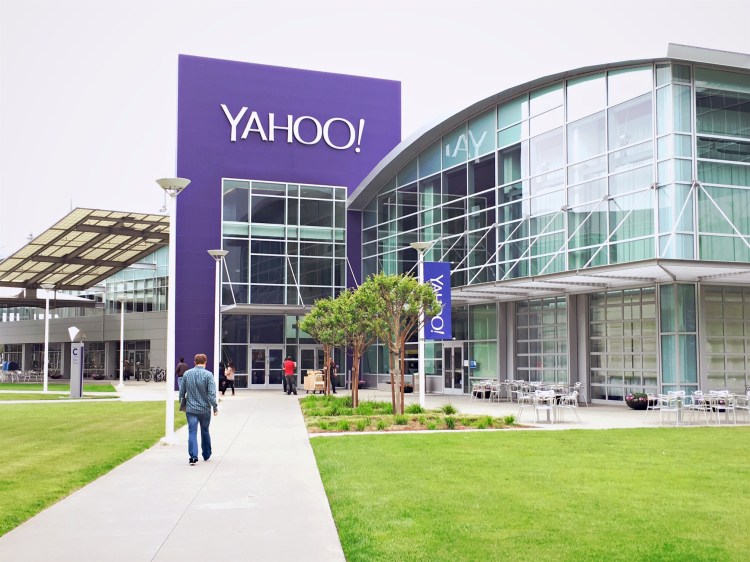In what is expected to be its last earnings ever as a public company, Yahoo’s (YHOO) second quarter financial results didn’t disappoint. It announced today that it took in revenue of $1.31 billion and had an earnings per share of $0.09. But perhaps what everyone had been waiting for wasn’t immediately revealed: Who will be buying Yahoo?
By comparison, Wall Street analysts had been expecting Yahoo to bring in $1.08 billion in revenue and an EPS of $0.10.
While the company did not disclose a potential acquirer, it did say that it has recorded a “non-cash goodwill impairment charge” of $395 million and also a “non-cash intangibles impairment charge” of $87 million relating to its buy of Tumblr. If you’re wondering what a “goodwill impairment charge” is, it’s a conclusion that the asset (Tumblr) has been viewed by Yahoo has no longer being able to demonstrate expected financial results from the time it was purchased.
“Through disciplined expense management and focused execution, we delivered Q2 results that met guidance across the board and in some areas exceeded it. In addition to our efforts to improve the operating business, our board has made great progress on strategic alternatives. We are relentlessly focused on delivering shareholder value,” company chief executive Marissa Mayer said in a statement.
Yahoo’s Mavens initiative brought in $504 million for the quarter, a 25 percent increase from a year ago. What’s more, most of the increase in revenue came from mobile, up 50 percent from Q2 2015 to be $378 million versus 0.34 percent on desktop for $875 million.
Revenue from search dipped 17 percent annually to $765 million while the number of paid clicks decreased 24 percent along the same time frame.
The company’s stock closed the day up 0.61 percent at $37.95. In after-hours, shares have gone up 0.87 percent.
End of the road for Yahoo
Today’s earnings are significant in that it’s when all final bids are due for consideration relating to an acquisition of Yahoo’s core business. In February, the company revealed that it was implementing an “aggressive strategic plan” which not only resulted in 15 percent of its workforce being laid off, but essentially signaled all efforts for a successful turnaround have failed and it resigned itself to selling.
Much has changed since Marissa Mayer took over as chief executive four years ago. At that time, she hyped up her hiring, saying that she was looking forward to “working with the company’s dedicated employees to bring innovative products, content, and personalized experiences to users and advertisers all around the world.” Her efforts didn’t go unnoticed by shareholders and Yahoo’s stock steadily increased and subsequent earnings produced results.
Although on the rise (compared to previous CEOs at Yahoo’s helm), Mayer’s rapid acquisition spree caught the attention of investors who questioned the strategy and some backfired in spectacular fashion. In 2013, Yahoo spent $1.1 billion to acquire Tumblr in an all-cash deal. Fast-forward to this year when Yahoo announced it was considering writing down the goodwill value of Tumblr.
During her time, Mayer has overseen the acquisition of more than two dozen startups, including Brightroll, Stamped, OnTheAir, Summly, Astrid, Xobni, Admovate, Flurry, and Polyvore.
After successive CEOs touting cost-cutting measures and laying off Yahoo’s workforce, Mayer once touted in 2013 on an earnings call that 14 percent of the company’s new hires were so-called “boomerangs,” former employees who have rejoined the flock. The expectation was that this CEO would give rise to a rebirth of Yahoo — it was a good thought, but unfortunately this prophecy hasn’t come to fruition. It looks like there was no way to save the struggling company.
Shareholder disapproval was apparent when it voted on Mayer’s reappointment to Yahoo’s board of directors. Approximately 18 percent of all the “no” votes cast were against her, which was much higher than previous years.
How Yahoo got to this point is a complicated story, but much of not only it but Mayer’s ultimate downfall relates to Alibaba and unsatisfactory returns to investors, such as Starboard Value, an activist firm who has fought for change within Yahoo’s management.
The company had intended to spin-off its 15 percent holding in China-based e-commerce service Alibaba, but surprised people by reversing its decision in December. At the time, Yahoo stated that it felt it wasn’t the best driver for long-term value for shareholders. “The Board will now evaluate alternative transaction structures to separate the Alibaba stake, focusing specifically on a reverse of the previously announced spin transaction,” it said in a statement.
Time to accept bids
Over the past few months, Yahoo has been exploring options for how it can sell itself and reports of interested bidders have been all over the place. Among the favorites to win the business is Verizon who reportedly enlisted the help of AOL CEO Tim Armstrong for help in making its bid more appealing. Other rumored bidders include AT&T, Daily Mail, Yellow Pages owner YP LLC, and private equity firms like TPG Capital LP.
Yahoo is expected to make its decision on which bid it’ll accept and as such, could seal the fate on Mayer’s tenure at the company. Should the new owners decide not to retain her services, she could walk away with a reported $55 million severance package.
But if it’s time has come, Yahoo doesn’t want to go out without a fight. In its earnings release, the company cited updates that likely are meant to show value to potential suitors. It noted that its efforts “kept Yahoo Mail one of the highest rated mail apps in both the App Store and Google Play” and also that it introduced support for live video on Tumblr, launched updates to its Yahoo News, Sports, and Finance sections on desktop, and have been adding new advertising offerings for brands.


